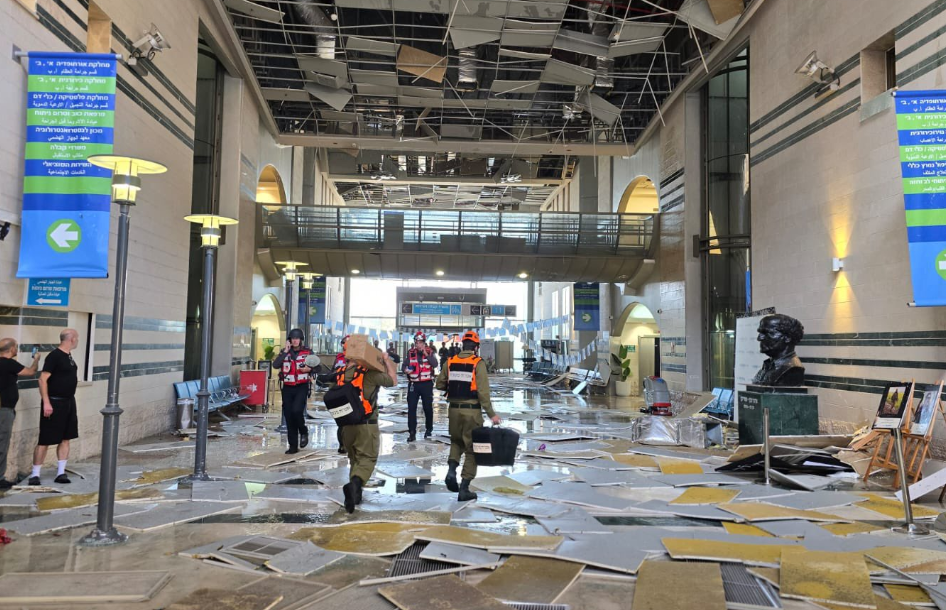Iran Attacks Soroka Hospital in Israel:The Israel-Iran war has entered its seventh day with deadly missile and drone attacks. Iran launched ballistic missiles targeting Soroka Hospital in Beersheba and civilian areas, injuring dozens. Israeli Prime Minister Netanyahu vows full retaliation. Iran deployed its Sejjil ballistic and Fattah hypersonic missiles for the first time in combat. The US and Russia are closely monitoring, with Trump considering military intervention and Khamenei warning of severe consequences. Tensions are rising, risking a dangerous regional escalation.
Iran Attacks Soroka Hospital in Israel
The ongoing conflict between Israel and Iran has entered its seventh consecutive day with continuous exchange of missile and drone strikes. Tensions have now reached a point where the possibility of US military involvement is being actively discussed, raising concerns about a much wider conflict in the region.
In the most recent developments, dozens of civilians in Israel have been reported injured following the latest barrage of missiles launched from Iran. One of the significant attacks included a ballistic missile strike on Soroka Hospital located in the southern Israeli city of Beersheba. The city skyline was filled with smoke trails and puffs of smoke as visuals captured the aftermath of multiple missile interceptions and impacts.
Reacting strongly to the hospital attack, Israeli Prime Minister Benjamin Netanyahu issued a stern warning. He stated, “This morning, Iran’s terrorist tyrants launched missiles at Soroka Hospital in Beersheba and at a civilian population in the center of the country. We will exact the full price from the tyrants in Tehran.” His remarks reflect Israel’s firm stance on retaliating against Iranian aggression and underline the high-stakes nature of the ongoing conflict.
According to Israeli military officials, who spoke on condition of anonymity, Iran has so far fired approximately 400 ballistic missiles and launched over a thousand drones targeting Israeli territory since the conflict began last Friday. The official further confirmed that about 20 missiles have managed to strike civilian areas across Israel so far. These figures mark an unprecedented scale of missile activity between the two nations.
In a significant escalation, Iran claimed to have deployed its advanced Sejjil ballistic missile for the first time under actual combat conditions. As reported by Iran’s Tasnim news agency, citing sources within the Islamic Revolutionary Guard Corps (IRGC), Tehran launched three Sejjil missiles into Israeli territory. The Sejjil is a two-stage medium-range ballistic missile with a maximum range of 2,000 kilometers, capable of reaching deep into enemy territory.
Adding to the intensity, Iran also confirmed it had used its Fattah hypersonic missiles during the recent strikes against Israel. This marks another first in the conflict, signaling Iran’s readiness to use its latest military technology on the battlefield. Meanwhile, reports from Iranian state television accused Israel of attacking Iraq’s heavy water reactor, although they assured that no radiation danger exists since the facility had been evacuated ahead of the attack.
Israel, anticipating the threat to sensitive locations, had earlier warned residents near the Iraqi facility to evacuate the area as a precautionary measure. The Israeli military has remained on high alert, responding swiftly to the missile launches and issuing warnings across different parts of the country, including northern regions where air raid sirens were activated following the detection of drones from Iran.
The escalating situation has drawn sharp reactions from global leaders. US President Donald Trump, stated that he is seriously considering joining the Israeli strikes. According to reports by The Wall Street Journal, Trump has already approved several attack plans but is momentarily holding back to see if Iran shows any willingness to halt its nuclear program. Trump emphasized that he would wait until the last possible moment before making a final decision, acknowledging the unpredictability that war often brings.
In a stern warning to Washington, Iran’s Supreme Leader Ayatollah Ali Khamenei declared that any US military involvement would result in irreparable damage. In a speech broadcast on Iranian state television, Khamenei asserted that Iran would never surrender to external pressures. He stressed that no wise individual, familiar with Iran’s history and resilience, would ever suggest that Iran should capitulate. According to him, the Iranian people are determined to defend their sovereignty regardless of external threats.
Russian President Vladimir Putin also weighed in on the crisis, suggesting that a negotiated settlement to end the conflict is still possible. He noted that Israel’s strikes have actually solidified domestic support within Iran around its leadership. However, both Trump and French President Emmanuel Macron have expressed skepticism about Putin’s proposal to act as a mediator, citing Russia’s ongoing war in Ukraine as a significant conflict of interest.
As the conflict intensifies and international players weigh their options, the world watches closely, aware that any misstep could potentially trigger a broader war engulfing the region and beyond.
Disclaimer:
This article is based on ongoing conflict developments between Israel and Iran. The situation is highly volatile and details may continue to evolve rapidly. The information provided is for informational purposes only and should not be interpreted as official policy or guidance. Readers are advised to follow multiple sources for the most updated and verified information.

